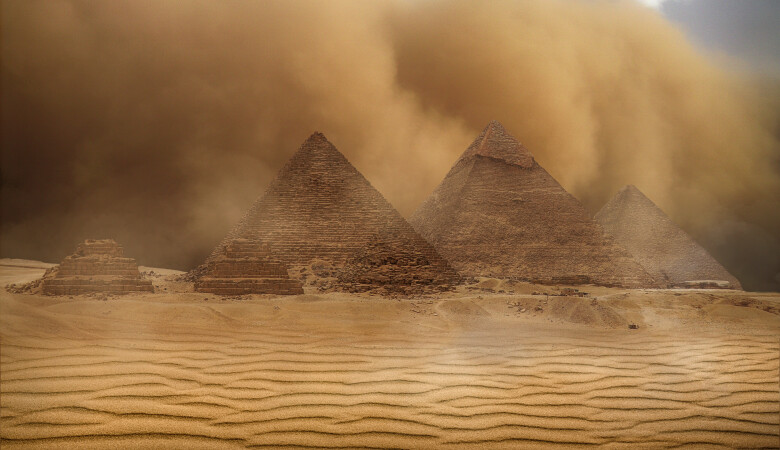The Glory of the Lord Revealed to Comfort His People (Isaiah Sermon 45 of 80)
August 31, 2014 | Andy Davis
Isaiah 40:1-14
Prophecy
Pastor Andy Davis preaches a verse-by-verse expository sermon on Isaiah 40:1-14. The main subject of the sermon is the comfort God provides to His people.
- SERMON TRANSCRIPT -
I. “Comfort My People” (vs. 1-2)
So I'm a man under authority today, I've been given a message from God, and my job, my task, is to deliver this feast to you without doing anything to mess it up. And that's my desire. I feel like a table waiter, and I've been told by the master chef, "This is the food, this is the meal, and I want you to bring it to the people." And when we come to the incredible words of Isaiah 40, I'm not the first table waiter to bring this message. As a matter of fact, the first was Isaiah himself. And the chapter begins with a direct command to him. The grammar of Isaiah 40:1,2 is interesting. It's a command coming from Almighty God to a single individual. It's a little clearer in the KJV. "Comfort ye," so that's imperative in that Old English style. The individual that was being addressed was Isaiah the prophet. He's being given a command by Almighty God to speak a word of comfort to the people of God. And it's strong, too, because He says it twice. "Comfort, comfort my people, says your God." And so, I have a commission, I'm in a long, long line, a numberless line of proclaimers of these truths, and I'm just taking my place in line and I get to do the very same thing. I get to speak to you who are in the Kingdom of God, to you who have been redeemed by the blood of Jesus. I get to speak to you a word of comfort from Almighty God.
And what a privilege that is. What an incredible message Isaiah 40 is. It's so glorious. The poetry, the images that flow in this chapter are so rich and full. It's easy, perhaps, for someone who loves poetry or images or literary things to study it as a piece of literature, and therein lies some of the danger. This isn't a piece of literature, this is the Word of Almighty God. God is speaking this to us. And He commands Isaiah the prophet to comfort His people and He says, "Speak tenderly," in the NIV, "Speak tenderly to Jerusalem." The words in the original language is, "Speak to the heart of." Speak to the heart. Speak to her heart. Almost like feminine language here, like a suitor speaking to a woman. Tenderly, words of courtship, words of tender affection. "I want you to speak tenderly to Jerusalem, I want you to speak to her heart." Or perhaps, like a father speaking tenderly to a young child some words of instruction or correction or training. "Speak tenderly. Speak to the heart of." I think in the absolute sense, in the big picture, it's "Speak sovereignly, speak the word of transforming grace to people who without that word will have hearts of stone and continue living in rebellion. So speak to the heart of my people. Speak tenderly. Speak this word." It's poignant and powerful.
What Is the Comfort? Three Things (vs. 2)
What is this comfort? This dual comfort, "Comfort, comfort my people, says your God." In other words, Isaiah the prophet's saying, "You are the people of God. I want you to know what your God is telling me to tell you. I want you to know that God, your God, wants you to be comforted. He really wants you to feel comforted." Well, comforted about what? Well, he says three things. Jerusalem's "hard service" it says. Generally, the translation is "warfare." Warfare has been accomplished or finished. "Her sin has been paid for that she has received from the Lord's hand double for all her sins." So, the context here is warfare, the warfare of Zion, the warfare of Jerusalem, the warfare of the people of God, of the Jews.
Context of the Comfort: Jerusalem’s Sin
Now, there was an immediate context in Isaiah's day. But then, there was a timeless context to the people of God in every generation. In the immediate context, Isaiah the prophet, living there in 700 BC or so, after the Assyrians have been swept away by the sovereign hand of God and godly King Hezekiah's rebuilding what the Assyrians have destroyed and they're going on with their history, He's already predicted in Isaiah 39 that someday Judah and Jerusalem will go off into exile in Babylon for sins.
But now, he is looking beyond that exile, amazingly, to the time when God will sovereignly allow a remnant to go back to Judah and Jerusalem and rebuild the city. So the immediate context is, all of that time of turbulence, that exile, that suffering, will come to an end and Judah will be able to return and rebuild Jerusalem, rebuild the temple. That's the immediate circumstance, but the words just tower above that, the concepts go far beyond that immediate situation. God is speaking through this chapter to every generation of His people. And so, the warfare mentioned here is bigger than merely the Babylonian conquest and the destruction of Jerusalem and things like that. No, I think the warfare is explained by the rest of the phrase. Her warfare has been accomplished, her sin has been paid for. The Bible reveals that, apart from Christ, naturally, every one of us is at war with God, and even more significantly, that the Holy God is at war with us. Now, if you're lost, if you're not a Christian, you may not feel that at all, you may not be aware of that, but the Bible says it's true. If you're outside of Christ, the wrath of God remains on you every day.
You're under the judgment of God. God, in His holiness, is at war with you and you may say, "Why?" It's because of His holiness and your sin. And my sin. That's why the warfare is there. We are sinners, we have violated the laws of God, there's iniquity in us, unrighteousness in us. That's the warfare. But there will come a time when that warfare will come to an end. It will end forever at a certain point, because God is speaking to us a word of comfort in the Gospel. And that word of comfort is, ultimately, we know through Christ, through His shed blood on the cross, God is at peace with us. And we, through the work of the Spirit of God, are now at peace with Him. We are reconciled, we're in a good relationship with God. And that is comforting, isn't it? That is comforting. And it says that Jerusalem has received from the Lord's hand double for all her sins.
Now, this is a vital statement here. Salvation originates with Almighty God. "She has received from the Lord's hand, double for all her sins." We can't save ourselves, there's nothing we can do to change this status of warfare with God, nothing. All we can do is make it worse by continual sin. We can't change it, we can't reconcile God to us by any good works or any pious attitudes or turning over of new leaves or any of that, we can't do it. No, it must come from God. Salvation is from the Lord. And so, Jerusalem has received from the Lord's hand, it says, "Double for all her sins." Now, I have meditated on this. I've read the commentaries, I've tried to understand what does this mean? Some commentators say that Jerusalem has been punished far more, perhaps, than she expected, which is true, I think that's true. I think people just generally underestimate where the sin is going to lead, just how bad it's going to get. Vastly underestimate just all the things that sin brings into your life, and that you end up getting far worse, double what you thought it would be.
But I actually don't think that's what this is talking about here. I actually think that what happened to Jerusalem, the invasion of the Babylonians, the destruction of the city, the destruction of the temple is far less than they deserved, actually. Far less. So I don't think that's what double means here. No, I think this has to do with the worth and value of the atoning work of Jesus Christ, that we have received from the Lord's hand, through Jesus Christ, infinitely more than we needed to be reconciled. That the worth of the blood of Jesus just towers above the weight of our sins. Now, our sins are weighty, because God is holy and our sins are more numerous than the hairs of our head, that is true. Our sins are like vast mountains and they're numerous. So I'm not minimizing sin, I'm just maximizing the worth of the atoning work of Jesus Christ.
Jesus' blood is worth more than the impact, the weight, of all of my sins and all of yours and all of the sins of the whole world, and if there were a billion other worlds, just like this, it'd be more than all of that, too. That's the infinite worth and value of Jesus, and it comes right down to roost on us who are Christians, and we come to understand how sinfulness we are. You're getting educated on that. You know what I mean, brothers and sisters? You're being trained in sanctification, you're being led by the Spirit to find out how much you needed a Savior, how much you needed Jesus. You underestimated it when you first came to Christ. He's teaching you now, you know. And He's educating you on how hard your heart was, and still is, and how, as I mentioned a moment ago when I was up here talking about David Platt, how grievous it is the limits we'll put on what we'll do for God, how we'll give a certain amount of money and we'll give a certain amount of our time and our effort, but we're not going to sell out for this. And it's grievous and we see it and it's like, "Wow." The Spirit says, "In effect, you haven't seen anything yet, but I would just destroy you if I showed you the whole truth, but I want you to know this, dear child of God, where sin abounds, grace abounds all the more."
Isn't that comforting? "Comfort, comfort, my people", says your God." It doesn't matter how great your sins are. The worth of the atoning blood of Jesus is infinitely greater. I've used this analogy before, I keep using it almost daily in my own life. My sin, your sin could be likened to a fire. Some days, my sin is like a match, some days it's like a torch, some days it's like a bonfire on a beach, some days it's like the World Trade Center on September 11th. God's grace is like the Pacific Ocean, can handle all of the above. All of it. His grace in Jesus is infinitely greater than my sin, and that is incredibly comforting for me. And this message needs to be spoken because we are sinners, all of us. From the very beginning of this book, this has been the theme of Isaiah, one of the great themes, not the greatest theme, but one of the great themes, the great wickedness, the sinfulness of the people of God and how much we need the saving work of Jesus.
And so, from the very beginning of this incredible book, Isaiah 1, Verse 2, "Hear O heavens, listen O earth for the Lord has spoken. I reared children and brought them up, but they have rebelled against me."
And then, he unfolds very plainly in chapter, after chapter, after chapter, how God's created people, human beings have specifically rebelled against Him. Their idolatries, in Isaiah chapter 2. Isaiah 5 has a litany of sins of Judah and Jerusalem, just one thing after another, luxury and immorality, and injustice, and drunkenness, and brutality, and all of these sins just flowing. And we know it's true of us too and we deserve, they deserve eternal condemnation, and God in His grace gave them exile instead. And so, God is speaking to us now a greater word of comfort than He spoke immediately to those Jews who were going to be restored at some point and go back to Jerusalem, and that greater word of comfort is the saving work of Jesus Christ. It's clear now, we've got the New Testament, we've got the gospels, we know what Christ has accomplished. It was just spoken in prophetic vision at that point, but now we know. Let me just stop and just apply this to you right now. Does this bring you comfort today? Does it? Does it bring you comfort every day? Are you comforted as a sinner, saved by grace?
Now, I know that it's the task of a preacher to disturb the comfortable, so the Word of God can do that, but here, the word is, "Please comfort the disturbed. Comfort them, and encourage them."
II. Prepare the Way of the Lord (vs. 3-5)
Secondly, verse 3-5, Prepare the way for the Lord. "A voice of one calling in the desert, 'Prepare the way for the Lord, make straight in the wilderness a highway for our God. Every valley shall be raised up and every mountain and hill made low. The rough ground shall become level and the rugged places a plain, and the glory of the Lord will be revealed, and all mankind together will see it for the mouth of the Lord has spoken.'"
By the way. I hope you see why I'm preaching three sermons on Isaiah 40 here. How rich is this? How rich are these words, and how powerful. So relax, we're not going to get to all, even all of verse 14, these 14 verses. But look what it says here. "A voice of one calling in the desert."
Let's just pause for a moment, and try to understand this desert. We're going to see this image again and again, this poetic image of the desert, the wilderness in Isaiah 40-49, especially. What is it? Well, it should be understood both literally and figuratively. Okay? Obviously a desert is a place where nothing is growing, where there's no water, there's no life, it's a sterile barren place, hostile place. It is, I believe, a picture of Judah and Jerusalem under judgment, from God for their sins, also. So, it's a literal thing because God did judge the Promised Land. Remember how it was said to be a land flowing with milk and honey, a land you didn't have to irrigate with a foot pump like you had to do back in Egypt. No, it drinks in the rain from heaven, and it's lush and there are these huge clusters of grapes that you need a huge pole to carry, and it's just a lush land.
Yeah, but by the time the sinful Jewish nation got done with it, it was a land under judgment. Remember how in the time of Elijah there was this drought, three years, specifically predicted by the book of Deuteronomy, "If you turn from me, says the Lord, to idols, the gods of the nations that you're going to displace, if you do that, I will command the heavens to stop raining on you and the Earth will turn into powder and dust beneath your feet." So, it's literal, but it's also metaphorical or spiritual for the hearts and the lives of people apart from the grace of God, people in their sins. This desert. And we're going to see the desert turned into a garden of Eden again, in these chapters. We're going to see the sovereign grace of God pouring down the rain of the Spirit and causing the people of God to flourish under His grace. Now in the desert, in the midst of their rebellion in the midst of their sins, there is this voice, a voice of someone calling in the desert, "Prepare the way for the Lord, make straight in the wilderness a highway for our God."
This Passage Fulfilled: John the Baptist Prepares the Way for Jesus
Well, we know who this is. If there was some other immediate kind of fulfillment of this... Something, some individual or individuals before the New Testament era, I don't know, but all four Gospels: Matthew, Mark, Luke, and John, all four take these very words and apply them to John the Baptist. For example, Matthew 3:1-3, "In those days, John the Baptist came preaching in the desert of Judea, and saying, 'Repent for the kingdom of heaven is near.' This is he who was spoken of through the prophet Isaiah, 'A voice of one calling in the desert, 'Prepare the way for the Lord, make straight paths for Him.''" So who was this individual, this John the Baptist? He was, I think, the last old covenant or Old Testament prophet, even though he's written about in the New Testament era, he came in the spirit of Elijah as a direct fulfillment of that prophecy in Malachi. He came in the spirit of Elijah, he kind of dressed like Elijah, he wore camel's hair and a belt of leather, just like Elisha the Tishbite did. He ate locusts and wild honey.
Now, the honey I get, but the locusts, look it up if you don't know what I mean. Can you imagine doing that? But that was clean food. You could do it under the Law of Moses. I don't know if you would have enjoyed it. I'm just going to move on right now. But that's what he ate. But what was really important was his ministry, he lived, he was born, I think six months before Jesus Christ and you have the story in Luke about how all that came about and he preached powerfully in the desert and he baptized repentant people for their sins.
“Every Valley Raised” and “Every Mountain and Hill Levelled”
And it says, "Every valley shall be raised up, and every mountain and hill shall be leveled." Now, what does this statement mean? Well, first of all, you must understand, John the Baptist was not a civil engineer. We're not looking for literal fulfillment of this leveling of mountains and raising up of valleys. That's not what he did. His work was the work of a preacher, a prophet, a proclaimer of truth and a baptizer of people. So, in that manner, he leveled mountains, in that manner, he raised up valleys.
Now, a simple interpretation of this is everything has to be gotten ready for the coming of the Lord, and that's valid. So you don't want to look at details or spiritualize them, just simply say, things have to be made ready in sinners' hearts before Jesus can come. There has to be a preparatory work of grace in someone's heart before they're ready to come to Jesus. And so that preparatory work is frequently painful, it's difficult. They see their sinfulness, their wickedness, they're in misery, they understand they're lost. They feel it acutely. And they know they need a savior, but they don't have an answer, they don't know what to do, and then the gospel comes and brings good news to them, and so there has to be a preparatory work, a leveling work, a work of grace. So that's a simple way. And I think we could all sign off on that, but I'm going to go on, and I'm going to press some of the details here.
Every mountain and hill will be leveled. The mountains and the hills here are obstacles to the coming of Jesus, they're obstacles. In Isaiah 2, we have this image of lofty things that represents the idolatrous hearts of human beings and especially the arrogance of human beings thinking they don't need Jesus, they don't need a Savior, they're fine in their religion, they're fine in everything that they could do. And so when John saw many of the Pharisees and Sadducees coming to where he was baptizing, this is what he said to them, "You brood of vipers! Who warned you to flee from the coming wrath? Produce fruit in keeping with repentance. And do not think you can say to yourselves, 'We have Abraham as our father.' I tell you that out of these stones God can raise up children for Abraham. The ax is already at the root of the trees, and every tree that does not produce good fruit will be cut down and thrown into the fire. I baptize you with water for repentance. But after me will come one who is more powerful than I, whose sandals I am not fit to carry. He will baptize you with the Holy Spirit and with fire. His winnowing fork is in his hand, and he will clear his threshing floor, gathering his wheat into the barn and burning up the chaff with unquenchable fire."
That I think is a leveling of every mountain and hill, leveling. These arrogant, self-righteous people needed to be leveled before the word of God, the word of Christ could come to them. Conversely, there are other people who feel so crushed by life, frankly, and so crushed by their sins, and so crushed by the justice and the wrath and the righteousness and holiness of God, that they just are utterly despairing of any hope of salvation for themselves. And they are too broken to even try, or even think there could be an answer for them. They are in this sense valleys that need to be lifted up, they need to be given hope that God could forgive them, that there could be grace for them, that there is an answer. And he did this by his baptism. And he was baptizing sinners who are coming to him and repenting and so there was a sense that they could be cleansed of their sins and restored and made new. And so John the Baptist came to do that.
The Glory of the Lord Revealed... in Jesus Christ
And then it says, "And the glory of the Lord will be revealed, and all mankind together will see it." Don't you see how beautiful that is, how John the Baptist had the privilege of pulling back the veil and saying, "Behold your God. Look at Him, behold Him, see Him." How do you do that? Well, one day Jesus of Nazareth, Jesus Christ, came to him to where he was baptizing, and wanted to be baptized and he said, "I need to be baptized by you, and do you come to me?" Now, John says in John chapter 1, I wouldn't have recognized Him except the Spirit told me that He was the one, He didn't look unusual, extraordinary, He just looked like anyone else. But John knew who He was. And he heard the testimony of God the Father from heaven. As soon as Jesus came up out of the water, a voice came, a dove came down, heaven was torn open, a dove came down representing the Holy Spirit and a voice came from heaven, saying, "This is my Son whom I love, with Him I am well pleased." John heard that voice himself in a special way as a prophet of God, and he said, "I have seen and I testify that this is the Son of God." And then the next day when he saw Jesus coming toward him, he said, "Behold the lamb of God who takes away the sins of the world."
So, we have in verse 5 of our text the glory of the Lord is revealed in the incarnation of Jesus, His status as fully God, fully man. Who walked on the face of the earth, who lived a life, a sinless life, and then who at some point in God's purposes, at some point in the fullness of time, died on the cross, shed His blood under the wrath of God, as an atoning sacrifice for sinners like you and me. Behold the lamb. Behold the Lamb of God who takes away the sins of the world. And all mankind, all flesh, the KJV says, together will see it for the mouth of the Lord has spoken. How do we do that, how do we do that now, how do we see the glory of Jesus?
Well, you almost sometimes you need to close your eyes and just listen to the Word of God, close your eyes and just have someone speak these words, "This is My Son, whom I love; with Him I am well pleased." Picture the heaven torn apart and the Dove descending on Jesus, and this voice coming, picture John the Baptist pointing to a man and saying, "Behold the Lamb of God who takes away the sins of the world." You can see in your mind's eye, by faith through the hearing of the word of God, you can see the glory of Jesus. It's the only way, it's the only way. Everyone, it's available for everyone, all over the world, people from every tribe and language and people and nation can hear this message and see the glory of Jesus. And they do it by faith, by faith that comes from hearing the words about Jesus. Now there's going to come a day in the future, when the full glory of Jesus will be unveiled, revealed to the human race, and no one, no one will need any faith on that day.
Jesus spoke of that day in Matthew 24. In verse 30, He says, "At that time the sign of the Son of Man... " That's His name for Himself. "Will appear in the sky and all nations will mourn. They will see the Son of Man," listen, "coming on the clouds of the sky with power and great glory." They'll see it with their own eyes, no faith needed. And it speaks of that also in Revelation 1:7 where it says, "Behold He is coming with the clouds and every eye will see Him. Even those who pierced Him. And all nations on earth will mourn because of Him. So shall it be, Amen." So there's coming a day when everyone will see Jesus in the sky with great glory and no faith needed then, but understand, at that point the opportunity for justification by faith alone will be over, no one will be saved by that sight, those who were not saved the day before that, those who had not found Christ before that will be condemned for their sins. Today is the day of salvation, today's the day to trust in Christ.
And so I appeal to you. I don't know you all, I don't know what's going on in your life, I don't know what's going on in your heart. But I'm pleading with you, to see Jesus' glory now in the gospel, the glory of Christ who died on the cross in your place for sins, under the wrath of God, see Him in your mind's eye. See Him on the third day, raised to life bodily and call on the name of the Lord, that your sins may be forgiven. Don't leave this place lost. See Him. The Glory of the Lord revealed in your heart.
III. Human Glory Fades; God’s Word Stands (vs. 6-8)
And do it while you still have time because verses 6-8 say, your glory, my glory, it's fading away. Look at verses 6-8, it says there, "A voice says, 'Cry out.' And I said, 'What shall I cry?' 'All men are like grass, and all their glory is like the flowers of the field. The grass withers and the flowers fall, because the breath of the LORD blows on them. Surely the people are grass. The grass withers and the flowers fall, but the word of our God stands forever.'"
So this section begins, A voice says, Cry out. This must be the voice of God. So Isaiah the prophet is saying, Someone's saying, Cry out, it must be God. But I don't know what to say. What should I say? What shall I cry out? What's the message? I'm a table waiter, I'm not going to write the message. "No prophecy of scripture ever had its origin in the will of man, but men spoke from God as they were carried along." So what do you want me to say? Alright, tell them this, tell the human race, these words, "All men, all humanity is grass and all of their glory is like the flowers of the field, the grass withers, and the flowers fall. Surely the people are grass." It's like Isaiah says, That's the message. I'm going to go preach it. But yeah, I agree, I see it, I see it happening, I see that people are grass, I see their glory fading and the word of our God standing forever. What does that mean? Well, this is very humbling for us but we need to face it.
James says, when we look in the Scripture, you're looking in the mirror. Well, look at yourself now, look at yourself in the mirror of the Word of God and see grass, see a flower of the field. You may be in your prime, whatever that means, you may be in your prime. In our culture, that means young and athletic and attractive and all that. Okay. I could say a lot of things right now, but I'm just going to keep moving, alright? We are mortal. You know what that means? We're going to die. Actually more than that, it means we are dying. We're in the process right now of dying. We're mortal. What's happening? We are aging, our cells are replicating, but imperfectly. We are developing wrinkles, our eyesight isn't what it used to be. We're losing abilities. Now you say, "Well I'm not, I'm 16." Alright, you're reaching, you're ascending to the peak, but if you live long enough, if God lets you live long enough, you're going to crest and you're going to find the back side.
Now, some of you are saying, "Pastor, you haven't seen anything yet. Don't talk to me about that. I already have a sense of how it's going to go, but I'd rather just... " At any rate, so that's it. And we have in our culture a big deception on this issue going on with cosmetic surgery and Botox and plastic surgery, and all kinds of techniques to stave off what's so obvious. All flesh is grass, we're dying, we're going to die. We age, and we can't do anymore the things we could do when we were younger. I read recently an optimistic article about how Michael Jordan can still dunk at age 51. I see the writing on the wall on that one. Alright, do you see it? I don't know if he sees it. But I see it. He's in a battle with age, he's in a battle with time, and time's going to win because all flesh is grass. Not just some. Everything, our awards, our accolades, our skills, all of them are like the grass of the field. People forget, no one cares anymore. Who won the Academy Award for best supporting actor in 1955?
I hope none of you are taking your smartphones right now and seeking to answer the question. It is answerable. But if you go there, you'll probably find out you don't know the dude. Okay. I didn't know him, I'd never heard of him. That year On The Waterfront was the big movie and all that. So you probably heard of Marlon Brando, but you've not heard of this best supporting actor. Look it up later if you want. But the point stands, we don't know who this guy is. And maybe that was his moment of glory when he got that statuette and all that, but it's faded now, what does it mean?
Isaiah the prophet is going to talk about Cyrus, just says Cyrus. Humans added the phrase, The Great, Cyrus the Great. He's going to win an empire, but then you know what's going to happen to him? He's going to die, and he was buried at some place in Iran, Pasargadae. I don't know how to pronounce it, but it may be so. And there's this windswept tomb there, and according to an ancient historian named Plutarch, the tomb was inscribed originally with these words, "Oh man, whoever you are, and wherever you come from, for I know you will come, I am Cyrus who won the Persians their empire. Do not, therefore, begrudge me this bit of earth that covers my bones." There's your glory, there's your empire there's all your power and your grandeur. You can't even read those words now, they're effaced by wind and time and sand, rain. You extend this to all the earthly glory that could ever be pursued, the glory of massive buildings. We know what happens to Twin Towers in an instant, we've seen it now. Maybe you couldn't have believed it before you saw it, but how those twin towers came down in a few minutes down to a pile of rubble. So it will be with all human glory, the glory of fame fades away.
I tried to pursue on the internet famous people in the 19th century who now no one knows, hard to get at. Didn't know what to Google. So I'm just saying, there must have been some... Because I don't know who they are. That's the whole point, maybe a Shakespearian actor who was all the rage in New York City for about 12 years and now no one knows his name. I don't know, all flesh is grass. All glory is fading. Even ordinary people, not famous people, they ascend, they reach a peak and then they come down, throw a stick in the air, watch it, that trajectory, that's you. That you. And in the future generations, people won't even know who you were, probably, unless you're famous. But you have to be really famous that if five, six, seven generations go down that anybody would know your name.
All Flesh Is Grass – Only Hope is Christ’s Resurrection
And why is this? It's because we're all of us under the curse of Adam, we are all destined to return to the dust. We came from the dust, and we'll go back to the dust. There's your trajectory, you're up and down, you're a stick thrown in the air and comes back down. Some go higher, some lower, but they're all coming back down. It's all the same shape, because of Adam. Do you not see now the glory of these words spoken by our Savior, "I am the resurrection and the life, he who believes in Me will live even though he dies, and whoever lives and believes in Me will... " What? "Never die." Do you not see the value of that, the value of this gospel promise, that we will live forever? The contrast though to human flesh is God's Word that never fades, "Surely the people are grass," verse 8, "The grass withers, and the flowers fall. But the Word of our God stands forever." God's breath blows on people, and they fade, it's not an accident that we die. But God's breath also speaks out His word and He ordains that that lives forever.
Jesus said "Heaven and earth will pass away, but my words will never pass away." He said in the Sermon on the Mount, "I tell you the truth, until Heaven and Earth pass away, not the smallest letter or least stroke of a pen will by any means disappear from the law until everything is fulfilled." God's Word is eternal. 1 Peter says that this is the word that was preached to you, this gospel message was preached to you. How awesome is that? And it speaks of a life incorruptible, eternal life that God is offering to you through the resurrection of Jesus Christ from the dead.
IV. Behold the Greatness of God: Gentleness and Majesty (vs. 9-14)
Now verses 9-14, I'm only going to touch on lightly. Okay, lightly, really lightly. Next week we're going to talk more in depth about the majesty, the greatness, the infinite majesty of God in these verses. But I just want to make one simple point here, and behold the greatness of God in a conjunction, a combination of infinite majesty and gentleness with sinners like you and me. So look at these verses, 9-14, "You who bring good tidings to Zion, go up on a high mountain. You who bring good tidings to Jerusalem, lift up your voice with a shout, lift it up, do not be afraid; say to the towns of Judah, 'Here is your God!' See, the Sovereign LORD comes with power, and his arm rules for him. See, his reward is with him, and his recompense accompanies him. He tends his flock like a shepherd: He gathers the lambs in his arms and carries them close to his heart; he gently leads those that have young. Who has measured the waters in the hollow of his hand, or with the breadth of his hand marked off the heavens? Who has held the dust of the earth in a basket, or weighed the mountains on the scales and the hills in a balance? Who has understood the mind of the LORD, or instructed him as his counselor? Whom did the LORD consult to enlighten him, and who taught him the right way? Who was it that taught him knowledge or showed him the path of understanding?"
So, we messengers... So, pastors, preachers, evangelists, missionaries, fine, but all Christians, we messengers, we should go up on a high mountain and proclaim this good news. What is the good news? Here's the good news: Behold your God, God is at the center of the good news, the greatness of God, and we're going to see His glory. Verse 10 talks about His power, He's going to come with might and His arm rules for Him, He's going to bring His reward with Him, but also his recompense. So He's going to reward His servants and He's going to punish His wicked enemies, both of those are going to happen. He's going to come. But in the middle of all of this, this greatness, this incredible God who measures the waters in the hollow of His hand and with the breadth of His hand marks off the cosmos. We'll talk about all that next week. This incredible God is able to tend His flock like a shepherd and gather the lambs up in His arms and gently lead those that have young.
Do you feel the need for that today? Have you ever felt the need for that? You feel shattered, you feel broken by sin, you feel discouraged, you feel downcast. Satan is working on you, and you feel so weak. Picture Jesus your good shepherd, scooping you up and holding you in His arms, that's the picture of this infinite majestic God, who takes His hand and marks off the cosmos, this same one picks you up and holds you tenderly and speaks comfort, comfort into your ears. How sweet is that? Like I said, next week we're going to talk more about the infinite majesty of God.
V. Application
Some quick applications, I've been making applications throughout the sermon, but I want to plead with you again to come to Christ, I want to plead with you, who even now you're still holding out, you're not sure if you need the Savior, you do. Trust in Him. Trust in Him.
And understand how God has provided an end to the war between you and God, you can feel and know and experience the peace of God in your heart, you can know forgiveness, and ample provision is made for the forgiveness of your sins. Those of you that are Christians, I invite you to just drink in and feel around you, the comfort comfort of the first verse, and the fact that He has provided double, infinitely enough for all your sins, and that He is tending you now like a good shepherd, and leading you gently and wisely. Rejoice in that, feel the comfort for that. And if I can urge you, behold your God more than you do, behold Him more than you do, more clearly and more frequently.
So I would just suggest read this more. Read it, it's the only way you're going to see this invisible God, by seeing Him by faith, we walk by faith, not by sight, pick up the scriptures, don't miss a day, don't miss a day. Feed on Him, Behold your God, see His glorious greatness, behold your God and look forward to the second coming of Christ, when all nations will see Him and be heartbroken over those that will mourn when He comes back. And urge yourself and others to do everything you can to look forward to the day of God, and speed its coming by evangelism and missions. If I can just give a simple application, if you have time to come minister to some internationals at tomorrow's picnic, there's an application. Pick up one of the parking things there and come and let's meet some internationals. And that's the cheapest simplest mission trip you've ever had. You get to sleep in your own bed, you even get to eat foods that you recognize. Alright, and have a good time and you also get to invite people to come to know Christ, invite them to church, get to know them. It's a fantastic time of sharing.
next week get ready for some explosive things that we see the infinite majesty, the greatness of God in the rest of this section of Scripture. Close with me in prayer.































